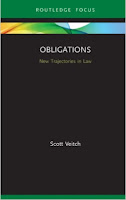In December 2021, Critical Legal Thinking published four responses to the recent book authored by Professor Scott Veitch, who is Paul KC Chung Professor in Jurisprudence at HKU Law. Professor Veitch then responded to the responses. An excerpt from the first response is provided below with links to the other responses and Professor Veitch's reply.
Julen Etxabe
Critical Legal Thinking
Published on 14 December 2021
We continue our series on contemporary critical (legal) books with a series of responses to Scott Veitch’s, Obligations: New Trajectories in Law (Routledge, 2021). We will post four responses to Scott’s new work, each picking distinct themes which together testify to the richness of the book’s scholarship. Next week Scott will respond.
Those familiar with Scott Veitch’s earlier body of work will not be surprised by the wide-ranging, incisive and witty style of Obligations, his contribution for Routledge’s series New Trajectories in Law. This is not to diminish the accomplishment: Veitch’s impressive capacity of condensation, its intellectual and historical breadth, and the clinical precision with which he dissects the subject-matter deserve high praise. His “new trajectory” is at once a retrieval of an overlooked genealogy, a critical diagnosis of the times, and the groundwork for its renewal.
The book is not a critique of rights per se, but of their dominant role as the defining, almost exclusive, language of our age. Not only are obligations historically prior, but they are substantially more robust and perform a “connective work” that rights simply do not. Above and beyond a primordial “right to have rights,” then, Veitch envisages an antecedent world of obligations that ground human relations and their political institutions, which make rights possible (34). However, he is too acute a thinker simply to suggest a reversal: “To expose and understand the fact of their [obligations’] priority must not therefore entail necessarily valorizing it: context matters” (18). ... Click here to read the full commentary, here to read the commentary by Matt Stone, here to read the commentary by Margaret Davies, here to read the commentary by Stacy Douglas, and here to read Professor Scott Veitch's reply.


No comments:
Post a Comment